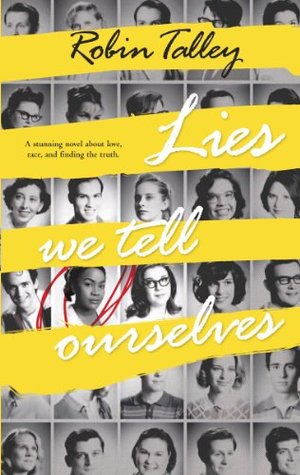 It's been nearly four months since we first came to Jefferson. Still, every day, when I walk out of that school building, my heart pounds and my hands tremble. Every day, there's a roaring in my ears no voice can penetrate.
It's been nearly four months since we first came to Jefferson. Still, every day, when I walk out of that school building, my heart pounds and my hands tremble. Every day, there's a roaring in my ears no voice can penetrate.Can you imagine going to school worrying about whether you'd be hung from the flag pole? Imagine not being able to join the cheerleader team because nobody would hear your cheers over the sounds of people calling you names. Imagine fearing for your life every day.
In 1959, five years after the federal courts said integration of school was the LAW, the state of Virginia still balked, protested, and even shut the schools down to avoid this. This was way after Little Rock. But imagine being the first African-American to enter this school, this place in which there was so much resistance to your presence. The heroine, Sarah, faces this nonsense along with 9 others. It's an angry mob of white kids day after day, hour after hour, yelling, screaming names and insults, throwing baseballs and spitting. Stories like this make me very ashamed to be American.
Sarah's parts were just painful to read. Sad. I cried, grew angry, and many times had to set the book aside as my emotions were just too much. Robin Talley did a superb job.
But the blurb doesn't mention that there's another battle here, another type of prejudice that Sarah must worry about on top of this. The hatred against gays. She's attracted to her own sex and is constantly trying to hide it, has been raised to feel ashamed of her feelings. It's unnatural. Sinful. And things get out of hand with a white girl named Linda, who is also confused.
And this is where the book lost me. I'm totally fine with the lesbian story line, but if you're going to make two girls attracted to each other, make something attractive about them! While Sarah was a sweet and strong soul and I could see why Linda would be attracted to her, I could not--not even for a second--see what Sarah saw in the racist, bigoted, evil Linda. Sarah's attraction to Linda was just completely unbelievable to me. I don't care that Linda changed in the end--too little too late. She was an ugly person still.
And I'm torn as to what I thought about Linda's parts. She was half the narrative. She's ugly and has ugly thoughts. I didn't care to read about her racist, nasty ways. BUT on the other hand, I admire the way the author tackled this: showing us both sides of the race issue. Did I agree with Linda? Not one little bit, but I came to understand that she was merely brainwashed and as she slowly learned to think for herself, she was confused. What she'd been told and what she was seeing were two entirely different things. Her story really goes to show how much our parents influence us.
I appreciate learning about this particular situation in American history. It didn't stop with Little Rock. You hear so much about LR, but not Virginia. I hated how ugly things were, but it really happened that way. I think the writing is stellar, but the lesbian story just didn't work for me in light of what I mentioned above. There was never anything attractive about Linda. I just can't see or feel this supposed connection. It came out of nowhere. I also think that the blurb should at least hint to this extra story line, as the LBGT thing isn't for everyone.


No comments:
Post a Comment